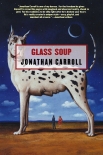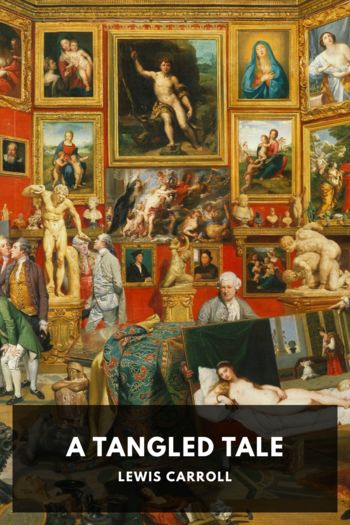GLASS SOUP, Jonathan Carroll [important of reading books .txt] 📗

- Author: Jonathan Carroll
Book online «GLASS SOUP, Jonathan Carroll [important of reading books .txt] 📗». Author Jonathan Carroll
Haden asked the question first that was simultaneously on Leni’s mind. “Every dream we had meant something? Every one of them? The dream where I went into the kitchen and made a grilled cheese sandwich with a banjo instead of a frying pan? That meant something?”
“No, only some dreams; maybe ten or twelve over the course of your lifetime. For example both of you dreamt this meeting when you were alive, in your own separate ways. Leni dreamt it when she was twenty-five, Simon when you were nine. Both of you dreamt it exactly as it is now—this stage, the three of us talking, the works.”
Now it was Haden’s turn to squirm on his bar stool. “I dreamt of Leni when I was nine?” He sounded incredulous.
“Yes, but you quickly forgot about it the next morning. The only thing you remembered was a big version of me,” Bob scolded.
“Why do we have those dreams? What good does it do to see the future if you have no context?”
For the bear it was a relief talking to Leni Salomon. She was so much more rational and easy to deal with than Haden. She didn’t explode in anger or tiresome, self-pitying rants like Simon so frequently did. A no-nonsense pragmatist, Leni asked pertinent questions and then moved on after getting the answers, whether she liked them or not.
“Remember those tests where they showed you ten or twenty different photographs very quickly and then afterwards questioned what you remembered?”
“When they asked for details in the pictures?”
“Exactly.”
Haden and Leni nodded as one—they remembered.
Bob went on. “There was a time when you would have remembered everything in every photograph. You could have said how many blades of grass there were. Or how many clouds were in the sky and described each of their shapes, everything. But I’m not really talking about photographs now—I’m talking about your dreams.
“At the beginning, mankind had two minds. One you could call his day mind, the other the night mind. They complemented each other perfectly and were meant to work in concert. When a problem arose in your daily life that you were unable to solve, normally all you needed to do was go to sleep. Then the night mind, with its different way of perceiving things, would take over and help figure it out. Not always, but much of the time. Using these two together like that kept you more balanced, open to other possibilities and approaches.”
“It sounds like that right and left brain theory. You know the one that says each hemisphere of our brain has its specific purpose. One is creative, the other is analytical—”
Bob dismissed her statement with a wave of its big white paw. “No, Leni, it’s very different from that. The reason why people have such difficulty understanding life is because it is meant to be comprehended on both a conscious and unconscious level. Imagine your life as a piece of meat that can only be properly eaten if you have both an upper and lower set of teeth to chew it.” To demonstrate this, the bear placed its paws together one on top of the other. It flapped them open and closed a few times like a masticating jaw.
Haden wasn’t having it. “Most of my dreams are ridiculous. The rest are forgettable.”
“You’re right—now they are, but not in the past.”
“How come our two brains don’t work together anymore?”
“Chaos.” Bob said the word calmly and evenly.
“Explain.” Haden looked at Leni to see if she was paying attention. Then he slowly crinkled his nose, narrowed his eyes, and held up a finger for the others to wait a sec while his body decided whether or not it wanted to sneeze. It did. He was one of those sneezers who are so violently loud that they can drown out any sound in a room when they let fly. Leni saw it coming on his face and turned quickly away—she had already experienced Simon’s blasts when they were alive.
Turning her head, she happened to look toward a far corner of the stage and saw something that caught her eye. Haden sneezed again. Very curious, Leni got off her stool and limped over to what she had seen. Bending down, she picked a bright yellow rectangular flashlight off the floor. The kind with a handle across the top and which throws a very powerful beam across any darkness. Stuck all over it were decals of Walt Disney characters.
“My God, this is it.” Cradling the flashlight in both hands she looked at it as if it were a holy object. She was so overwhelmed with emotion that she brought it to her lips and kissed it.
“What is that? What have you got there?” Simon asked in between sniffs.
She held up the flashlight so he could see it and said happily, “I haven’t seen this for twenty-five years. It saved my life when I was a kid. Is this the one, Bob, the real one?”
“Yes.”
“That’s so wonderful. I am really glad.” She returned to her stool, put the light in her lap, and covered it with both hands.
“What’s the big deal about a flashlight, Leni?”
“I was very afraid of the dark when I was a girl. My parents put night-lights in my room, left the door to the hallway open. I slept in their bed with them when things got bad, but nothing really worked.
“One summer I went away to camp. While I was gone my father painted the ceiling of my room a brilliant shade of turquoise and covered it with hundreds of gold stars all about this big.” She held up her thumb and index finger to demonstrate that the stars had been about the size of a large coin. “But best of all, he gave me this.” She





Comments (0)